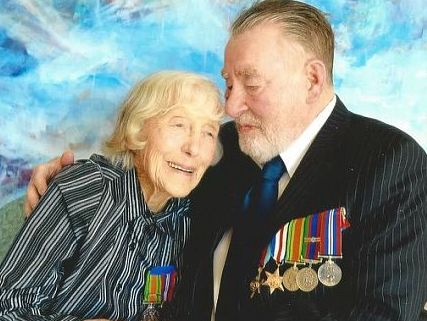|
On January 25th my Dad celebrated his century. At dinner he regaled us with stories from the farm, his war service and his many adventures, and reminded us again that his century has been one of rapid and accelerating change.
When Dad was a boy, horses were more common than tractors or automobiles. His first “city job” was a bread route which he didn’t have to learn because the horse already knew it. Self-driving vehicles are nothing new. He will tell you about their first radio, a crackly monster which brought the world into their living room, including the exciting and excitable Foster Hewitt and his Hockey Night in Canada. In those days people were famous because they did something remarkable, not because they were famous. He remembers the first telephone in his community, then another and another until nearly everyone had one. But in those days, of course, everyone shared a party line and the switchboard operator knew more about everyone’s personal affairs than did the local clergyman. War came and he went off to Europe in the Signals Corps, becoming an expert in telegraph and telephony. He moved forward as the front moved, setting up signal offices in caves, barns and hotels, some of which were still booby-trapped. A nice perk of the job was the ability to keep in touch with his English girlfriend (later his wife). When he returned to Canada with his war bride, it was to an era of dizzying change. Trains and ships gave way to air travel. Gravel country roads became superhighways. Televisions, colour televisions, dial telephones and electric typewriters-- one marvel after another in quickening succession. Dad became selective about which new technology to adopt-- a microwave oven was useful, for instance, but carrying a telephone around in one’s pocket didn’t strike him as practical. By the time Facebook, YouTube, Twitter and FaceTime arrived, he’d long since retired and his grandchildren, his gardening, his trees and his carpentry just never left him enough time to sit staring at a screen. Which may explain why he made the hundred. I’ve learned from my Dad that you don’t need apps to be a great communicator. He’s understood all along the importance of some eternal essentials of human communication-- clear language, active listening, storytelling, warm and respectful personal engagement, and (key for him) knowing what you needed and wanted to say before starting the conversation. Now officially a centenarian, these skills and instincts continue to serve him well. Photograph: Mum and Dad Bowley, Remembrance Day 2015
1 Comment
As professionals who communicate, let’s talk about the elephant in the room. As of January 20, 2017, Donald Trump is the 45th president of the United States, a position that used to carry the unofficial title of Leader of the Free World. We’ll see how that part turns out. Trump seems to break nearly every rule of the English language, sometimes “bigly”. He is so incoherent he can contradict himself several times in less than 140 characters. During the US election campaign he was ridiculed as a communication disaster, but today he is President. Maybe he got a little help from his friends and maybe he didn’t, but there’s no denying that he won the hearts of millions of Americans, including many traditional rust-belt Democrats, strategically taking the Electoral College. So does this mean Trump overturned all the principles of effective communication? No, on the contrary, Donald Trump actually proved three key rules of powerful communication, and we’d all do well to pay attention. First, he understood that our gut responds far more powerfully than our intellect. Without agreeing or disagreeing with McLean’s and Sagan’s “lizard brain” hypothesis, we can say safely that there is a part of us which communicates at a primal level, our visceral “fight or flight” instinct. All of us respond to these signals. Some of us give them sober second thought before reacting. Most don’t. Second, he kept his message simple. Everything was a variation on the theme “Make America Great Again”. Do you remember Hillary’s slogan? Of course you don’t. Third, he knew how to keep our attention, all the time. He owned the headlines. Did Hillary? No. Did Bernie? Yes, but that’s for another discussion. But the story is not over. Donald Trump makes three mistakes which will surely bring him down. The principles of communication are eons old, and you don’t trifle with them. Follow them and they will reward you, flaunt them and they will ruin you. His first mistake is that he doesn’t listen. All great communicators listen. The Gipper listened. You may think you don't need to listen because you are smarter than the rest of the world, but in the grand scheme of things the rest of the world will not agree with you. There is a God, but his name is not Donald. His second communication mistake is related to the first, and it is that he does not show respect. When someone speaks to us without respect, we resist the content of their message, even if we are terrified of them. We may respond outwardly as necessary to avoid being hurt, but we will not let them into our hearts. Ultimately, if a tyrant does not own our hearts, he will fall. The third failed pillar of communication is coherence. Undoubtedly Donald is brilliant, but because he lacks respect and moral compass, it doesn’t matter to him what he says. As a result, he just spews a stream of sales barf. He doesn’t make sense because he's not about logic. He’s not trying to convey sense, he’s trying to sell. His language is the verbal equivalent of a shell game-- no matter how hard you try to follow, everything is moving so quickly that you’re just bedazzled. He’s not trying to tell you, he’s trying to sell you. He’s the circus barker, the snake oil salesman. What does all this mean? It means that unless he can change the rules in time to save himself, Trump will ultimately fail. Provided that America remains a democracy with a free press and the rule of law, his failure to listen, to show respect and to speak coherently will erode his base, one disgruntled American at a time, until the day comes when the crowd agrees that the emperor has no clothes. Then, in the old American tradition, he will be tarred, feathered and run out of town on a rail, and nobody will mourn. If I’m wrong about the democracy, free press and rule of law part, God help us all. But I don't think I'm wrong. I believe the rules of communication are immutable, even if the results may take some time. It actually takes three or four seconds to ask, “Do you have one second for a quick question?”
That should be your first warning. The truly “quick question” needs no wind-up-- you just pop it: “Got change for a twenty?” “Going to the game tonight?” Those are fair quick questions, and they have quick answers. But when the questioner needs to soften you up with a preface, there’s generally a reason for it-- he knows that even if the question may be quick, the answer won’t be. That’s bad enough. Worse, the questioner usually takes a positive answer as license to unfurl a conundrum worthy of the Senate. Your time is going to get robbed, and you know it. For a professional, though, there is a far more sinister threat. More often than not you are being approached with the “quick question” because of your training and experience. Implicit in the “quick question” is that you will deliver an accurate professional opinion in an informal setting at no charge, but one upon which the questioner will rely to make some important decision. If your advice works, nobody remembers-- it was a “quick question”. But if it doesn’t, you’ll be blamed. In fact, even if your advice was sound, but misapplied or misapprehended, you’ll still be blamed. Because of the informal setting you’ll likely have no record, and probably no recollection. The listener, of course, will have a clear recollection of what was said, what he thought was said, or at least what he wants to remember was said. For professionals, there’s another problem with the “quick question”-- there is no such thing as a safe “quick answer”. If you don’t take the time to quiz the questioner to be sure he or she understands his or her problem, you may be giving an answer to a question he or she doesn’t even know he or she has. It will surely be misapplied, to your chagrin. As a professional, you are going to see nuanced issues that the “quick questioner” probably doesn’t want to hear about. If your answer is complete, qualified and useful, it won’t be quick. If it isn’t complete, qualified and useful, you may as well hand over your wallet and throw your certificates out the window. A greater abomination, the sinister bastard child of the "quick question" is the "quick question for a friend of mine". All of the evils mentioned here are about to be alloyed with hearsay, the outcome of which will be Shakespearean in dimension. Given the time demand and professional risk inherent in the “quick question”, you should develop a “quick response”, tailored to your personal and professional circumstances, which politely, gently yet firmly requires the questioner to come into your professional zone. Whether or not you bill for your time is up to you, but at least insist that your professional advice is given in a professional setting. |
AuthorNorman Bowley teaches the Alignment Doctrine and the Client Code-- secrets to building the professional practice you and your clients deserve. Archives
September 2020
Categories |
-
Home
- Video >
-
Communication
>
- Elements >
-
Modules
>
-
Modules A-M
>
- Avoiding amateurism
- Change: Understanding It, Facing It, Profiting From It
- Communication for Long Term Relationship
- Communications Horror Stories
- Communications that blow up in your face
- Communicating toward success
- Earning the Right to Be Heard
- Gerunds, Mesolects and Other Arcane Terms of Art
- Having a Toad Day
- Healthy Fear
- Hippos and Raccoons-- Deadly Underestimation
- How I Moved From Doing What I Liked to Doing What I Loved
- How to Be on the Same Wavelength as Your Audience
- How to Pick Up a Porcupine-- Dealing With Difficult People
- Key of Trust
- Manipulation
- Mastering the Technologies
- Mining the Subconscious
-
Modules N-Z
>
- Quick and Dirty-- the 80/20 Rule
- Sabotaging Your Message
- Scar Tissue
- Secrets of the Druids
- Some Specific Approaches to Communications
- Specific audiences
- Symbolism-- the Heart of the Communicative Process
- Talking to Yourself and Why You Should Do It
- The Difference Between Leadership and Management
- The Eyes Eat First
- The Eyes Have It
- The Lizard Within-- What Your Reptilian Brain Makes You Do
- The Media of Communication
- The Respect Deficit
- The Secret of Authenticity
- Thinking About the Kinds of English
- Websites, Blogs and Newsletters
- When you don't have time to plan
- When You'd Rather Shoot Yourself
- Who's your audience? Targeted communication.
-
Modules A-M
>
- About us >
- Norman Bowley
- FREE
- Services
- Testimonials
- Blog
- FREE
Proudly powered by Weebly


 RSS Feed
RSS Feed